|
|
|
Sort Order |
|
|
|
Items / Page
|
|
|
|
|
|
|
| Srl | Item |
| 1 |
ID:
150398


|
|
|
|
|
| Summary/Abstract |
This paper examines the integration properties of the total oil consumption in 57 countries for the period of 1965–2012. A combination of new and powerful linear and nonlinear stationarity tests are employed to achieve the objectives of the study. We find that the oil consumption series in 21 countries follow a nonlinearity path while those in the other countries are linear in nature. Evidence of the presence of a unit root is found for the total oil consumption series in 38 countries while the series is stationary in the remaining 19 countries. An important insight is that the blueprints that were designed to reduce oil consumption are likely to have a permanent effect in most of the countries.
|
|
|
|
|
|
|
|
|
|
|
|
|
|
|
|
| 2 |
ID:
106086


|
|
|
| 3 |
ID:
077021
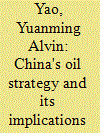

|
|
|
| 4 |
ID:
186433
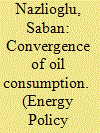

|
|
|
|
|
| Summary/Abstract |
Growing concerns about long-run equilibrium in the oil market have focused on understanding the time path of oil consumption across countries. This study examines the convergence of oil consumption across the largest oil consumers. To this end, we employ the historical oil consumption data dating back to 1890 by benefiting from the newly proposed convergence concepts, including relative/club convergence and weak -convergence, in addition to the conventional β-convergence notion. The empirical results provide new and insightful findings. First, considering common factors in the dynamics of oil consumption leads to convergence. Second, the overall evidence of absolute convergence has been at work among countries mainly before the great depression 1890–1929, while divergence occurs after the mid of 1990s. Third, the divergence observed over the last decades persists even after accounting for either a relative or weak form of convergence, supporting the primary role of the current dynamics in world oil markets. Divergence calls for stricter energy transition policies. Moreover, the clustering algorithm identifies unique convergent clubs, indicating that a unified energy policy is not tenable.
|
|
|
|
|
|
|
|
|
|
|
|
|
|
|
|
| 5 |
ID:
113474


|
|
|
|
|
| Publication |
2012.
|
| Summary/Abstract |
This paper examines cointegration relationships and Granger causality nexus in a trivariate framework among oil consumption, economic growth and international oil price in Portugal. For this purpose, we employ two Granger causality approaches: the Johansen cointegration test and vector error correction model (VECM) and the Toda-Yamamoto approaches. Cointegration test proves the existence of a long run equilibrium relationship among these variables and VECM and Toda-Yamamoto Granger causality tests indicate that there is bidirectional causality between crude oil consumption and economic growth (feed back hypothesis). Therefore, the Portuguese economy does not support crude oil conservation hypothesis. Consequently, policymakers should consider that implementing oil conservation and environmental policies may negatively impact on the Portuguese economic growth.
|
|
|
|
|
|
|
|
|
|
|
|
|
|
|
|
| 6 |
ID:
127902
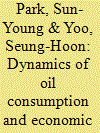

|
|
|
|
|
| Publication |
2014.
|
| Summary/Abstract |
This study attemps to investiagte the causal relationship between oil consumption and economic growth in Malaysia where oil consumption and real gross domestic product have been rapidly increased in recent years. To this end, the study employs annual data covering the period 1965-2011. Tests for unit roots, co-integration, and Granger-causality based on the error-correction models are presented. The overall results support the existence of bi-directional causality between oil consumption and economic growth in Malaysia. This means that an increase in oil consumption directly affect economic growth. Thus, in order not to make an adverse effect on economic growth, Malaysia should endeavor to overcome the constraints on oil consumption. Moreover, it appears that economic growth induces oil consumption
|
|
|
|
|
|
|
|
|
|
|
|
|
|
|
|
| 7 |
ID:
149948
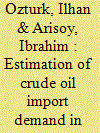

|
|
|
|
|
| Summary/Abstract |
The aim of this study is to model crude oil import demand and estimate the price and income elasticities of imported crude oil in Turkey based on a time-varying parameters (TVP) approach with the aim of obtaining accurate and more robust estimates of price and income elasticities. This study employs annual time series data of domestic oil consumption, real GDP, and oil price for the period 1966–2012. The empirical results indicate that both the income and price elasticities are in line with the theoretical expectations. However, the income elasticity is statistically significant while the price elasticity is statistically insignificant. The relatively high value of income elasticity (1.182) from this study suggests that crude oil import in Turkey is more responsive to changes in income level. This result indicates that imported crude oil is a normal good and rising income levels will foster higher consumption of oil based equipments, vehicles and services by economic agents. The estimated income elasticity of 1.182 suggests that imported crude oil consumption grows at a higher rate than income. This in turn reduces oil intensity over time. Therefore, crude oil import during the estimation period is substantially driven by income.
|
|
|
|
|
|
|
|
|
|
|
|
|
|
|
|
| 8 |
ID:
179731
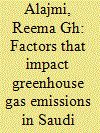

|
|
|
|
|
| Summary/Abstract |
Over the past three decades, Saudi Arabia's greenhouse gas (GHG) emissions have increased sharply. This study exposes the factors that affect GHG emissions in nine sectors via the logarithmic mean Divisia index (LMDI) method for 1990 to 2016. The analysis demonstrates that the energy effect was a leading factor increasing greenhouse gas emissions, at 386.76 million tonnes of carbon dioxide-equivalent (MTCO2e). Activity and population effects also contributed to the increase in emissions at 339.56 (MTCO2e) and 267.38 (MTCO2e), respectively, but the energy effect was greater than the other effects. Results reveal that activity, energy and population effects are greater in the electricity sector than the transport sector. The electricity sector increased greenhouse gas emissions by 4298.05 (MTCO2e) and transport, 2243.63 (MTCO2e). Therefore, policymakers need to consider climate change when they are developing economic growth plans to achieve sustainable development. This may be done through adopting a new policy to transfer from traditional sources to renewable energy sources or focusing on raising energy efficiency and changing energy structure to impact the growth of greenhouse gas emissions.
|
|
|
|
|
|
|
|
|
|
|
|
|
|
|
|
| 9 |
ID:
092836


|
|
|
|
|
| Publication |
2009.
|
| Summary/Abstract |
Oil consumption plays a vital role in socio-economic development of most countries. This study presents a flexible fuzzy regression algorithm for forecasting oil consumption based on standard economic indicators. The standard indicators are annual population, cost of crude oil import, gross domestic production (GDP) and annual oil production in the last period. The proposed algorithm uses analysis of variance (ANOVA) to select either fuzzy regression or conventional regression for future demand estimation. The significance of the proposed algorithm is three fold. First, it is flexible and identifies the best model based on the results of ANOVA and minimum absolute percentage error (MAPE), whereas previous studies consider the best fitted fuzzy regression model based on MAPE or other relative error results. Second, the proposed model may identify conventional regression as the best model for future oil consumption forecasting because of its dynamic structure, whereas previous studies assume that fuzzy regression always provide the best solutions and estimation. Third, it utilizes the most standard independent variables for the regression models. To show the applicability and superiority of the proposed flexible fuzzy regression algorithm the data for oil consumption in Canada, United States, Japan and Australia from 1990 to 2005 are used. The results show that the flexible algorithm provides accurate solution for oil consumption estimation problem. The algorithm may be used by policy makers to accurately foresee the behavior of oil consumption in various regions.
|
|
|
|
|
|
|
|
|
|
|
|
|
|
|
|
| 10 |
ID:
117007
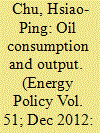

|
|
|
|
|
| Publication |
2012.
|
| Summary/Abstract |
This study examines the growth, conservation, neutrality and feedback hypotheses for 49 countries during the period from 1970 to 2010 using panel causality analysis: this technique accounts for both dependence and heterogeneity across the countries. The results provide evidence as to the direction of causality between oil consumption and output and are consistent with the neutrality hypothesis for 24 countries, the growth hypothesis for 5 countries, the conservation hypothesis for 13 countries, and the feedback hypothesis for 7 countries. The findings provide important policy implications for the 49 countries under study.
|
|
|
|
|
|
|
|
|
|
|
|
|
|
|
|
| 11 |
ID:
089931
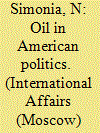

|
|
|
|
|
| Publication |
2008.
|
| Summary/Abstract |
Gradual consolidation at the domestic oil front allowed the American oil producers to ship their product in large quantities to Europe living through its industrial revolution. In 1870s and 1880s, America exported the larger part of the locally produced kerosene to Europe and Russia, two largest markets at that time.
|
|
|
|
|
|
|
|
|
|
|
|
|
|
|
|
| 12 |
ID:
112927


|
|
|
|
|
| Publication |
2012.
|
| Summary/Abstract |
A parametric analysis is used to examine the supply demand interactions between the US light-duty vehicle (LDV) fleet, its fuels, and the corresponding primary energy sources through 2050. The analysis emphasizes competition between conventional internal combustion engine (ICE) vehicles, including hybrids, and electric vehicles (EVs), represented by both plug-in hybrid and battery electric vehicles. We find that EV market penetration could double relative to our baseline case with policies to extend consumers' effective payback period to 7 years. EVs can also reduce per vehicle petroleum consumption by up to 5% with opportunities to increase that fraction at higher adoption rates. However, EVs have limited ability to reduce LDV greenhouse gas (GHG) emissions with the current energy source mix. Alone, EVs cannot drive compliance with the most aggressive GHG emission reduction targets, even if the electricity grid shifts towards natural gas powered sources. Since ICEs will dominate the LDV fleet for up to 40 years, conventional vehicle efficiency improvements have the greatest potential for reductions in LDV GHG emissions and petroleum consumption over this time. Specifically, achieving fleet average efficiencies of 72 mpg or greater can reduce average GHG emissions by 70% and average petroleum consumption by 81%.
|
|
|
|
|
|
|
|
|
|
|
|
|
|
|
|
| 13 |
ID:
106542
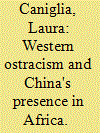

|
|
|
|
|
| Publication |
2011.
|
| Summary/Abstract |
Viewed within the context of China's history, development, and present conditions on the one hand and the geopolitical and economic situation on the other hand, this article argues that China's increased presence in Africa is the result of China seizing opportunities which arose in the wake of ostracism by major developed countries in their response to Chinese acquisitions in the energy field, rather than a carefully planned policy programme on the part of the Chinese. The consequence of China turning its attention to Africa to gain access to natural resources has been an increase in overall Chinese investments, as the central government has come to realize the full potential of Africa as a business partner.
|
|
|
|
|
|
|
|
|
|
|
|
|
|
|
|
|
|
|
|
|